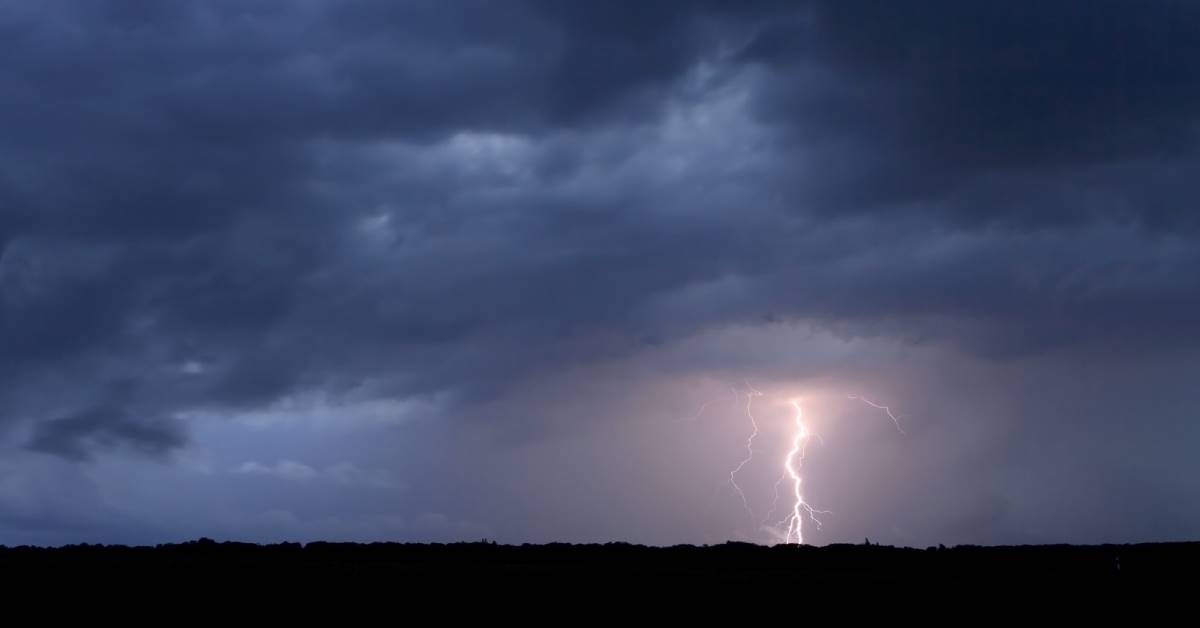Tips For Surviving A Storm While Outdoors
Editor's Note: Please follow the DEC and CDC guidelines to adhere to social distancing while hiking and recreating outdoors during this public health crisis. Hikers are asked to stick to trails close to home and only hike with immediate household family members. Read more from the DEC »
The last place you want to be when a storm rolls in is in the wilderness. Unfortunately, even if you've thoroughly planned your excursion and checked the weather multiple times before leaving, there are some cases where storms will pop up unexpectedly.
Here are some tips for surviving storms so you can be prepared next time you get caught in one!

Always Keep An Eye On The Weather
The best way to stay safe in a storm is to not get caught in one in the first place. If you don't have a smartphone or a battery-powered weather radio (or don't want to be bothered checking them while you're hiking, camping, or paddling), you can use your senses to detect changes in the weather that could signal an oncoming storm.
If it suddenly gets dark, if the wind begins to pick up, or if you can smell rain in the air, you should seek safety. If you can hear thunder, it means that you're close enough to be struck by lightning, which kills more than 50 people in the United States each year.
Summer storms are most common in the afternoon, so if you're planning a hike or other adventure, the best thing you can do is to head out early in the morning so you're back before the more dangerous time of day.
Head For Shelter
Being on a trail, in a field, or on a lake is not safe during a storm, so the first thing you should do - even if the storm doesn't seem bad yet - is seek cover. To be fully safe from lightning, you will need the protection of a significant shelter that has some type of grounding mechanism, like plumbing or wiring, to transfer the electricity from the shelter's roof into the ground. Without a grounding mechanism, your entire shelter could become electrified. Keep in mind not to touch plumbing, electrical equipment, metal objects, or water, as those could be electrically charged.
Being in a car is safer than being outside, but you should always keep the windows rolled up, refrain from using electronics, and resist leaning against the doors.
If There's No Shelter Nearby
Although finding shelter is ideal, it is possible that you'll be stuck without it. In this case, there are still things you can do to make yourself as safe as possible. If you're in the forest, avoid lone trees and tall objects, and seek cover in an area with lots of tree growth or a low, dry area.
If you're in an open area, seek out a valley and crouch down into "the smallest target possible." Cover your ears and make as little contact with the ground as possible by ballancing on the balls of your feet.
If you're on the water, bring your vessel to shore as quickly as possible, then take one of the aforementioned actions depending on the makeup of the shore.
If you're with a group of people, separate yourselves by about 20 feet so your individual targets decrease in size. If you're huddled together and one person gets struck, everyone in the group will get electrocuted.
Other Tips
- Never cross an open area during a storm, even if it is on your way to shelter
- 30/30 Rule: Stay in your shelter if lightning and thunder are less than 30 seconds apart and for 30 minutes after hearing the last clap of thunder
- If your backpack has a metal frame or if you have any metal equipment, make sure they are far away from you
- It is safer to be outside of your tent in a heavily wooded area than inside it during a storm
- If someone in your group is struck by lightning, call 911 immediately and administer CPR if necessary
Although it is never guaranteed that you'll be safe from lightning when your only option is to remain outside, following these tips will help improve your chances of avoiding being struck.
Sources:
WildBackpacker.com- http://www.wildbackpacker.com/wilderness-survival/articles/surviving-a-lightning-storm/
Adventure.howstuffworks.com - http://adventure.howstuffworks.com/how-to-survive-a-storm.htm